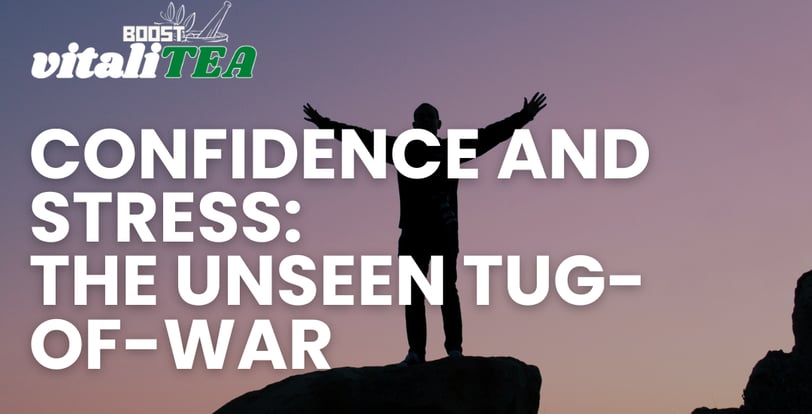Confidence and Stress: The Unseen Tug-of-War
Is your stress really about your workload—or your self-worth? In this post, we explore how low confidence can quietly amplify stress, even among high-achievers. Discover why common affirmations might backfire, how overachievement masks insecurity, and what it truly takes to rebuild confidence from within.
Sean
5/15/20253 min read


Confidence and Stress: The Unseen Tug-of-War
When we talk about stress, we often think of external triggers—deadlines, exams, heavy workloads. But beneath those layers lies something more personal and often overlooked: our confidence level.
The Confidence-Stress Link
Research has consistently shown a strong correlation between low self-confidence and higher stress levels. A 2020 study published in the Journal of Health Psychology found that individuals with lower self-esteem exhibited significantly higher levels of perceived stress, anxiety, and emotional exhaustion compared to those with higher self-esteem. Confidence, it turns out, isn’t just about self-image—it’s directly tied to how we interpret and respond to life’s challenges.
People with lower confidence often feel more threatened by uncertainty. They doubt their ability to cope, which makes even small tasks feel overwhelming. As a result, stress piles up—not because the challenges are inherently bigger, but because they feel heavier to carry.
But… What About Overachievers?
At the same time, you might wonder: what about those high-flying overachievers who seem super confident? Aren’t they stressed too?
Yes—and here’s the nuance. Many overachievers aren’t stressed despite their confidence—they’re stressed because of the lack of it. Dr. Valerie Young, a leading expert on the Impostor Phenomenon, explains that some high performers are driven by a deep, persistent fear of not being good enough. Their confidence is fragile, heavily tied to results and recognition. When they don’t hit a milestone, their self-worth takes a hit.
This results in a cycle of “I must do more to feel enough.” Subconsciously, they may not truly believe in their future success—so they overcompensate in the present. From the outside, it looks like ambition. On the inside, it feels like anxiety.
Recognizing Low Confidence Is Not Weakness
Whether you’re struggling to raise your hand in a meeting or constantly chasing your next goal to feel worthy, recognizing your confidence level is not shameful—it’s powerful. It’s the first step toward understanding where your stress is really coming from.
Why “You’re Amazing!” Doesn’t Always Work
You’ve probably heard this advice: “Just tell yourself you're smart, capable, beautiful!”
While affirmations can have short-term value, repeating positive mantras without believing them can backfire. According to a study published in Psychological Science by Wood, Perunovic, and Lee (2009), people with low self-esteem actually felt worse after repeating overly positive self-statements like “I am a lovable person.” Instead of boosting confidence, the affirmations reminded them of the gap between how they feel and what they’re telling themselves.
So... How Can We Rebuild Confidence Without Adding Stress?
Build Micro-Evidence of Competence - Instead of focusing on huge goals, start collecting small wins. Dr. Albert Bandura’s theory of self-efficacy shows that belief in our ability grows when we successfully complete tasks, no matter how small.
Try this: List 3 things you did well today—not perfectly, just well enough. Repeat that daily.Practice Self-Compassion, Not Self-Esteem - Psychologist Dr. Kristin Neff advocates for self-compassion over self-esteem. While self-esteem often depends on being better than others, self-compassion is about being kind to yourself in moments of failure or inadequacy. Instead of “I must win,” say: “It’s okay to be learning. I’m still growing.”
Cultivate Attentiveness and Presence - Truly confident people often show their confidence not by speaking the most, but by being the most present. Whether at work, in writing, or in conversation—even during dull meetings or with people they dislike—they remain focused and respectful. Studies have found that attentive listening is linked to higher self-esteem and emotional intelligence. As Jim Collins noted in Good to Great, the most impactful leaders are quietly confident: humble, grounded, and purposeful in how they engage. Start by showing up fully—it’s one of the simplest, most powerful ways to build real confidence.
A Healthier Way to Thrive
Confidence isn’t arrogance. It’s quiet inner trust—that you’re capable, that you’re enough, that setbacks don’t define you. And when that inner trust grows, stress loses its grip.
At Boost Vitalitea, we believe that managing stress starts with knowing your mind. Whether through mindful moments with our herbal teas or deeper insights like these, we’re here to walk with you as you unpack what’s really weighing you down—and rediscover peace.
You don’t have to do more to be enough. You already are.
